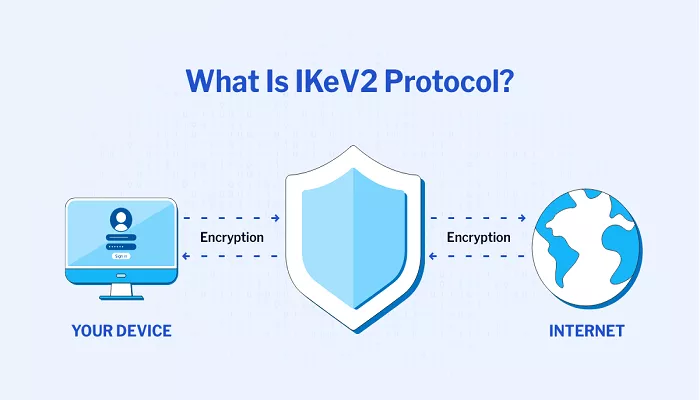In today’s digital age, ensuring secure and private communication over the internet is paramount. Virtual Private Networks (VPNs) play a crucial role in safeguarding online activities, and at the heart of many VPNs lies a protocol known as IKEv2. This article provides a comprehensive yet straightforward explanation of IKEv2, its functionalities, advantages, and its significance in the realm of online security.
What is IKEv2
IKEv2, or Internet Key Exchange version 2, is a protocol used to set up a secure and authenticated communication channel between two parties over the internet. Developed jointly by Microsoft and Cisco, IKEv2 is an integral part of the IPsec suite, which ensures data confidentiality, integrity, and authenticity. It is widely adopted in VPN services due to its robustness and efficiency.
How IKEv2 Works
IKEv2 operates through a two-phase process:
Phase 1: Establishing a Secure Channel
In this initial phase, the client and server authenticate each other and agree upon encryption methods. They use a technique called Diffie-Hellman key exchange to securely generate shared keys without transmitting them over the network. This results in the creation of a secure tunnel, known as the IKE Security Association (SA), through which further communication can occur safely.
Phase 2: Securing Data Transmission
Once the secure channel is established, IKEv2 manages the negotiation of IPsec SAs, which define how data will be encrypted and transmitted. This phase ensures that the actual data packets are encapsulated and protected as they traverse the internet.
Key Features of IKEv2
1. Strong Security Measures
IKEv2 employs advanced encryption standards, such as AES-256, to protect data. It also supports Perfect Forward Secrecy (PFS), ensuring that session keys are not compromised even if long-term keys are. Additionally, IKEv2 uses X.509 certificates for authentication, enhancing trust between communicating parties.
2. Mobility and Multi-Homing Support (MOBIKE)
One of IKEv2’s standout features is its support for MOBIKE, allowing seamless transition between networks without dropping the VPN connection. This is particularly beneficial for mobile users who frequently switch between Wi-Fi and cellular networks.
3. Efficient Connection Establishment
Compared to its predecessor, IKEv1, IKEv2 requires fewer message exchanges to establish a connection, resulting in faster setup times and reduced latency. This efficiency makes it suitable for applications requiring quick and reliable connections.
4. NAT Traversal Capability
IKEv2 includes built-in Network Address Translation Traversal (NAT-T) functionality, enabling it to function effectively in environments where devices are behind routers performing NAT. This ensures broader compatibility across various network configurations.
Advantages of Using IKEv2
- Reliability: IKEv2 maintains stable connections even when network conditions change, thanks to its MOBIKE support.
- Security: With robust encryption and authentication mechanisms, IKEv2 provides a high level of security for data transmission.
- Performance: Its efficient handshake process and support for modern encryption algorithms contribute to better performance and lower latency.
- Compatibility: IKEv2 is supported on various platforms, including Windows, macOS, iOS, and Linux, making it a versatile choice for VPN implementations.
Potential Limitations
While IKEv2 offers numerous benefits, it’s essential to be aware of its limitations:
- Limited Native Support on Some Platforms: Not all operating systems have built-in support for IKEv2, which may require additional configuration or software.
- Firewall Restrictions: Some firewalls may block UDP port 500 or 4500, which are used by IKEv2, potentially hindering its operation.
- Complex Configuration: Setting up IKEv2 manually can be complex for users unfamiliar with VPN configurations, although many VPN services provide user-friendly clients to simplify the process.
IKEv2 vs. Other VPN Protocols
When choosing a VPN protocol, it’s helpful to compare IKEv2 with other common options:
IKEv2 vs. OpenVPN
- Speed: IKEv2 generally offers faster connection times and better performance, especially on mobile devices.
- Stability: IKEv2’s MOBIKE support provides more stable connections when switching networks.
- Security: Both protocols offer strong security, but OpenVPN’s open-source nature allows for greater transparency.
IKEv2 vs. PPTP
- Security: IKEv2 provides significantly stronger security measures compared to the outdated and less secure PPTP protocol.
- Compatibility: While PPTP has broader compatibility with older systems, IKEv2 is more suitable for modern devices and networks.
Setting Up IKEv2
Setting up IKEv2 varies depending on the operating system and VPN service provider. Generally, it involves:
- Obtaining VPN Credentials: Acquire the necessary server address, username, password, and certificates from your VPN provider.
- Configuring the VPN Connection: Use your device’s network settings to create a new VPN connection, selecting IKEv2 as the protocol.
- Establishing the Connection: After configuration, connect to the VPN using the provided credentials.
Many VPN providers offer dedicated applications that simplify this process, automatically configuring the necessary settings for IKEv2 connections.
Conclusion
IKEv2 stands out as a robust, efficient, and secure protocol for establishing VPN connections. Its support for mobility, strong encryption standards, and reliable performance make it an excellent choice for users seeking a secure and efficient VPN connection, especially for mobile devices and frequent network changes. Although it may have some limitations, such as the need for certain firewall configurations and occasional complexity during setup, its overall benefits far outweigh these drawbacks for most users.
As the demand for faster, more secure, and reliable VPN connections continues to rise, IKEv2 remains a top choice for many VPN service providers and users worldwide. Whether you’re using it for personal privacy, accessing geo-restricted content, or ensuring secure corporate communications, IKEv2 offers a balance of security, performance, and flexibility that few protocols can match.
If you’re considering using IKEv2 for your VPN, ensure that it’s supported by your operating system and VPN provider, and follow proper configuration steps to get the most out of this powerful protocol.
For further details or troubleshooting, it’s recommended to refer to your VPN service provider’s help center or consult dedicated online forums focused on VPN technologies.

